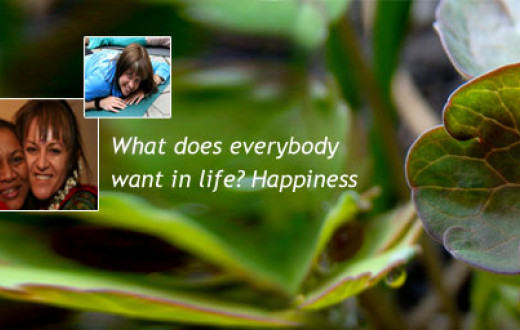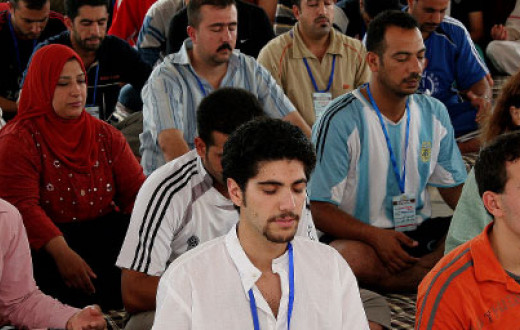06.12.2009 Turkey
Melbourne, December 4, 2009:
Below are excerpts of an interaction between Gurudev and youth from Australia
H.H Gurudev Sri Sri Ravi Shankar: There is an ancient saying: the first sign of intelligence is not to open your mouth! Having lost that opportunity, then you should not say anything unless you are asked a question.
I would like to open the floor, and ask you to ask anything - then we will take the thread from there.
Why are there differences between religions?
Sri Sri Ravi Shankar:
Religion has three components: symbols, customs and traditions, and values. As far as values are concerned, there is no difference, because all talk about oneness. Customs and symbols are all very different; they have to be, this is what makes the world beautiful, because God doesn’t like uniforms! Nature has been created with such diversity- so many flowers, animals, people. Diversity is the language of God. In India, God can have any number of names and forms, and they all point to one Divinity.
So in one sense, there is difference, and in another sense there is unity.
Wise ones celebrate diversity, fools fight over it.
So in one sense, there is difference, and in another sense there is unity.
Wise ones celebrate diversity, fools fight over it.
What are the three most important values?
Sri Sri Ravi Shankar:
You want to limit it to three?!
A sense of belongingness with the whole world. You have to take this stand, feel that you are part of the whole world and all are part of you.
Commitment to whatever you take up, and an integrity inside of you which says you are going to see your commitments through.
The third value is living in the present moment, not holding onto the past and getting into trouble in your own mind. Do you know how many problems we can create for others when we hold onto the past?
A sense of belongingness with the whole world. You have to take this stand, feel that you are part of the whole world and all are part of you.
Commitment to whatever you take up, and an integrity inside of you which says you are going to see your commitments through.
The third value is living in the present moment, not holding onto the past and getting into trouble in your own mind. Do you know how many problems we can create for others when we hold onto the past?
How does a youth handle the ups and downs of life?
Sri Sri Ravi Shankar:
I am a youth myself! Life is a mixture of everything: failure & success - they complement each other. If you fail, then you know the value of success, it is a stepping stone.
You need to move forward: ask yourself, what did I learn from the past, and then what is my vision for the future? This will keep you going. For this, you need presence of mind, and for this, you need to get rid of stress.
You are the player, not the pawn. If you are a pawn, someone else is moving you, and you have no control. You have to be the player, empower yourself, and that’s how these Art of Living programs can help you.
You need to move forward: ask yourself, what did I learn from the past, and then what is my vision for the future? This will keep you going. For this, you need presence of mind, and for this, you need to get rid of stress.
You are the player, not the pawn. If you are a pawn, someone else is moving you, and you have no control. You have to be the player, empower yourself, and that’s how these Art of Living programs can help you.
How do you detach yourself from the past, after learning whatever lessons it has to offer?
Sri Sri Ravi Shankar:
Lessons are an automatic phenomena, what you have experienced is the past. Living in the past means cribbing about the past. Life has much more to offer you.
What’s the role of pain and suffering in life?
Sri Sri Ravi Shankar:
Pain is unavoidable, but suffering is optional
I find the past very painful.
Sri Sri Ravi Shankar:
The past should be viewed as destiny. If you think you had a choice in the past, the present will be spoiled because you regret the past. Continued regret about the past creates a lot of toxins in the body, the future is not bright.
Past is destiny, done. And future is your freedom. In our teachings, we have karma and purushata - what you need to do. See the past as destiny, the future as free will, and live in the present moment.
Or make the past as free will, the future as destiny, and crib in the present moment! (Audience laughs)
Past is destiny, done. And future is your freedom. In our teachings, we have karma and purushata - what you need to do. See the past as destiny, the future as free will, and live in the present moment.
Or make the past as free will, the future as destiny, and crib in the present moment! (Audience laughs)
How to practice compassion and impartiality?
Sri Sri Ravi Shankar:
When you are unbiased in your mind, compassion simply flows. When you have belongingness with everyone, irrespective of their class, economic background, intellect, if you can connect, then compassion flows.
You could be anybody - Chinese, African - put yourself in different shoes, playing different roles, then suddenly you find that you are stuck as being somebody, and then you will see it is much more universal.
You could be anybody - Chinese, African - put yourself in different shoes, playing different roles, then suddenly you find that you are stuck as being somebody, and then you will see it is much more universal.
How to be selfless?
Sri Sri Ravi Shankar:
What is the purpose of selfishness? Wanting to be happy.
How can you be happy when your own family is not happy?
For you to be happy, you need the people around you to be happy. If your happiness includes everyone else, then you can be selfish! Be selfish, but expand your selfishness as much as you can! Don’t go to extremes - just see your capacity to expand your family.
Imagine if your neighbor behaves very selfishly. Would you like to be around him, does it solve anything? He plays loud music, then you play loud music. It will not bring calm. You expect consideration, cooperation, but how can you expect someone to deliver to you what you do not want to deliver to them.
How can you be happy when your own family is not happy?
For you to be happy, you need the people around you to be happy. If your happiness includes everyone else, then you can be selfish! Be selfish, but expand your selfishness as much as you can! Don’t go to extremes - just see your capacity to expand your family.
Imagine if your neighbor behaves very selfishly. Would you like to be around him, does it solve anything? He plays loud music, then you play loud music. It will not bring calm. You expect consideration, cooperation, but how can you expect someone to deliver to you what you do not want to deliver to them.
How do I do charity?
Sri Sri Ravi Shankar:
Three quarters can be given to your children, and one quarter to the child next door. Your first duty is to feed your children. As they say, there is enough for the need of the world today, but not enough for one’s greed.
Our centre in Bangalore is surrounded by villages. Unless the villages are kept clean, we cannot keep the centre clean and pure. So I said we need to build individual toilets for each family, and help to clean up the villages. Our center administration said we are always short of rooms in our center, we should build rooms in our centre rather than spend resources on cleaning the surrounding villages. And I said, the number of rooms will never be enough, the number of people visiting our center is always growing. We cannot wait for our needs to be fulfilled, and then one day start working in the village.
You cannot wait until all the needs of your family are met, and then do service. It has to be simultaneous.
Our centre in Bangalore is surrounded by villages. Unless the villages are kept clean, we cannot keep the centre clean and pure. So I said we need to build individual toilets for each family, and help to clean up the villages. Our center administration said we are always short of rooms in our center, we should build rooms in our centre rather than spend resources on cleaning the surrounding villages. And I said, the number of rooms will never be enough, the number of people visiting our center is always growing. We cannot wait for our needs to be fulfilled, and then one day start working in the village.
You cannot wait until all the needs of your family are met, and then do service. It has to be simultaneous.
Can the common man attain spirituality?
Sri Sri Ravi Shankar:
Only the common man can attain spirituality! If someone thinks they are very special, they cannot!
What are the three main things which have led to the success of the Art of Living?
Sri Sri Ravi Shankar:
Sincerity of purpose, inclusive attitude (all inclusiveness, no one is outside of us, sense of belongingness), and God’s grace!
What was your purpose in beginning this organization?
Sri Sri Ravi Shankar:
To see a smile on every face. I couldn’t stand tears running down anyone’s face.
The decisions which world leaders make have a great impact on us while the work that we do on an individual basis impacts only other individuals...
Sri Sri Ravi Shankar:
First, you should not think that politicians are a special species, they are one among us. Many times, they feel helpless. They want to change the society, turn around the economy, but find themselves helpless. Any sane politician wants to have violence out of society, but they feel their hands are tied. It has to come from society. You may think the other is powerful, in fact it’s a collective effort of everyone that make the society move - and NGOs, religious leaders, faith-based organizations, play an important part in bringing inspiration, inner strength.
The four pillars of society - politics, business, civil society and faith-based organizations - have to work in unison. The World Economic Forum has recognized the need for everyone to come together, so has the UN, and that is why they have made a caucus for religious leaders. A role has to be played by everyone, and we have to play in rhythm.
We need to spiritualize politics, to lessen corruption. We need to secularize religion, to lessen extremism and terrorism. Many think only they are going to heaven - I tell, you they make life for everyone a hell!
This is what spirituality is about - when you see the whole world as part of you, and you as part of everybody. There is that sense of sacrifice. Gandhi is a perfect example of being spiritual in politics. He was deeply spiritual, believed in truth and non-violence.
Finally, we need to socialize business, take up CSR (corporate social responsibility).
With these things, society will find a new level of understanding.
The four pillars of society - politics, business, civil society and faith-based organizations - have to work in unison. The World Economic Forum has recognized the need for everyone to come together, so has the UN, and that is why they have made a caucus for religious leaders. A role has to be played by everyone, and we have to play in rhythm.
We need to spiritualize politics, to lessen corruption. We need to secularize religion, to lessen extremism and terrorism. Many think only they are going to heaven - I tell, you they make life for everyone a hell!
This is what spirituality is about - when you see the whole world as part of you, and you as part of everybody. There is that sense of sacrifice. Gandhi is a perfect example of being spiritual in politics. He was deeply spiritual, believed in truth and non-violence.
Finally, we need to socialize business, take up CSR (corporate social responsibility).
With these things, society will find a new level of understanding.
Bomb dropped in Hiroshima, etc... All the major atrocities result from decisions made by politicians...
Sri Sri Ravi Shankar:
Politicians need to be spiritual. When you have compassion and caring you would not do that. Gandhi would never have done such things. Sometimes people are blind to any reason, but they would not turn to extreme measures unless it is absolutely unavoidable.
There is a saying in Sanskrit - first with peace, then with forgiveness, then with compassion. If nothing works, finally, take the stick.
There is a saying in Sanskrit - first with peace, then with forgiveness, then with compassion. If nothing works, finally, take the stick.


































